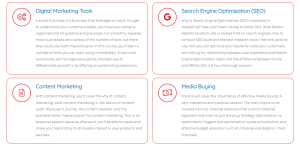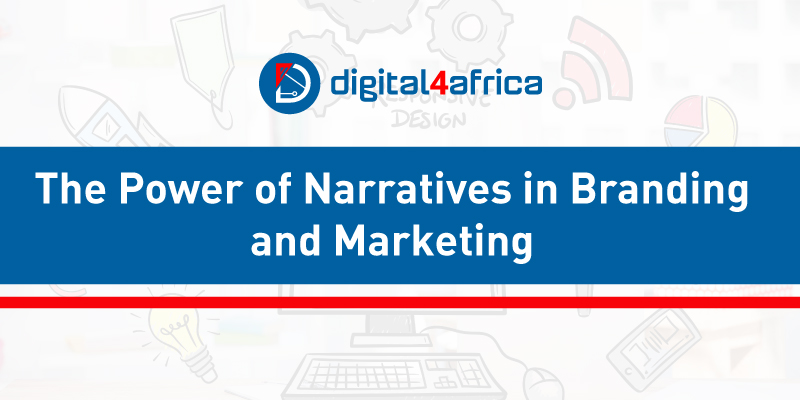The Power of Storytelling in Branding and Marketing
What Is Storytelling in Branding?
In today’s dynamic and competitive business space, customers identify with brands that pick them out of the crowd. They quickly develop trust with businesses that speak solutions to their personal problems. That’s where the art of storytelling in branding and marketing wields more unimaginable power than just a catchy logo or a memorable slogan.
In this article, we will demystify the art of storytelling. We will explore how to create a connection with our customers, employ strategies that leverage storytelling to build trust, and monitor the impact of storytelling in our brand marketing.
Are you ready to get started?
 Storytelling is the art of using narratives techniques to speak to your target audience at a personal level. Its very nature resonates with your audience creating a point-of-view of them being the sole beneficiary to your communication. By invoking their emotions in storytelling, your branding and marketing efforts cut through the noise capturing their undivided attention.
Storytelling is the art of using narratives techniques to speak to your target audience at a personal level. Its very nature resonates with your audience creating a point-of-view of them being the sole beneficiary to your communication. By invoking their emotions in storytelling, your branding and marketing efforts cut through the noise capturing their undivided attention.
Nonetheless, it is important to stay within the lines when it comes to the narrative technique. So then, let’s see how we can select the right narrative for our audience.
How To Choose The Right Story For Your Content
 A good story should align the solution your brand offers to the needs of your target audience. For the success of your storytelling efforts, your narrative ought to captivate your audience by paying more attention to you.
A good story should align the solution your brand offers to the needs of your target audience. For the success of your storytelling efforts, your narrative ought to captivate your audience by paying more attention to you.
When selecting a story, consider the following:
-
The Story
What message, service, or product do you want to communicate to them? This is a good place to package your brand’s values and strengths.
-
The Teller
Who is telling this narrative? Are you a confident, captivating, well researched storyteller? These are just a tip of the virtues that will aid your resonance with the audience you speak to.
-
The Audience
Who are you speaking to? Take a minute and isolate one persona from the crowd. They could be a middle-aged business man who needs an insurance policy for his new startup.
-
The Know
What is the most important piece of information you want them to remember from your story? This could be your service or product offer.
-
The Feel
What emotions would you want to invoke in them? Remember, people buy based on emotions like security, confidence, and excitement.
-
The Do
What is the immediate action you would want them to take after interacting with your story? Your purpose is to convert customer sales from your story. Therefore, a well crafted Call-To-Action would go a long way!
How To Tell A Good Story To Your Audience

When packaging your narrative to your audience, it is important that you give consideration to the following tips:
-
Understand your audience’s needs and interests
Tailor your story to resonate with the realistic needs, interests and pain-points of your audience. By aligning your story to their needs and interests, you increase the opportunity for more engagement and attention retention.
-
Captivate your audience from the start
Taking advantage of catchy hooks will boost your story’s relevance by double the odds. Hooks can range from surprising facts and provocative questions to intriguing anecdotes.
-
Create conflict and resolution
Give your audience the spicy stuff that makes them want to stick around. The conflict could be the pain-point they face and your solution as what they should be looking for.
-
Paint vivid pictures with descriptive imagery
The human mind adapts quickly to a good read. Storytelling enhances the memorability of your story through evocative visuals and adds impact and resonance.
-
Establish emotional bonds through evocative storytelling
Choose stories that invoke leverageable emotions from your audience. By doing so, you can align your brand with the emotional landscape of your audience.
-
Keep the message clear and concise
Simplicity is the key. Ensure your narrative is easily comprehensible by the slowest person in the room. You can achieve this by taking on a straightforward message to strengthen the impact of your narrative.
Case Studies of Well Crafted Stories You Can Use As Learning Aids
Learning is an active engagement that is improved by exploration. Below are examples of case studies that feature some of the best stories told by brands in marketing. Explore them deeper on a personal level to get the feel of well crafted stories.
-
Dove’s “Real Beauty” Campaign
It stands as a beacon of effective storytelling in content marketing, challenging societal beauty standards by showcasing real women with diverse body types and ages. The campaign aimed to promote body positivity and self-acceptance, generating a massive positive impact that significantly enhanced Dove’s brand image. By featuring relatable individuals, Dove successfully engaged its audience and sparked conversations about the definition of beauty.
-
Red Bull’s “Stratos” Campaign
It exemplifies how storytelling can create an epic brand experience. Documenting Felix Baumgartner’s record-breaking skydive from the stratosphere, Red Bull not only pushed the boundaries of conventional marketing but also established itself as a fearless brand unafraid of pushing limits. The campaign’s success was undeniable, amassing millions of views and solidifying Red Bull’s adventurous brand persona in the minds of consumers.
-
Coca-Cola’s “Share a Coke” Campaign
It took a creative and effective approach to storytelling in content marketing. By encouraging customers to purchase Coke bottles featuring the names of their friends and family, the campaign fostered personal connections with the brand. This unique strategy generated a considerable amount of buzz, enhancing Coca-Cola’s image and contributing to increased sales. The campaign demonstrated the power of creative engagement and personalization in content marketing.
-
Airbnb’s “Don’t Go There, Live There” Campaign
It showcased how storytelling can create a deeper connection with the target audience. By narrating the authentic travel experiences of Airbnb users, the campaign aimed to establish trust and convey the brand’s authenticity. The positive buzz generated by the campaign contributed to Airbnb’s positioning as a trusted brand in the travel industry, demonstrating the impact of authentic storytelling on brand credibility.
Avoiding Common Pitfalls in Content Marketing Storytelling
 To create a successful narrative that improves your storytelling and retains the attention of your audience, you may want to steer clear of the following bad habits in your branding and marketing strategies:
To create a successful narrative that improves your storytelling and retains the attention of your audience, you may want to steer clear of the following bad habits in your branding and marketing strategies:
Lack of Focus
It’s crucial to maintain a clear and focused storyline. A narrative that is scattered or lacks direction is unlikely to engage the audience and may not achieve the intended marketing goals.
Inauthenticity
Audiences can discern when a story feels fake or insincere. Ensure that your stories are genuine, staying true to your brand’s values and mission to foster a connection with your audience.
Failing to Evoke Emotions
Stories that lack emotional engagement are unlikely to leave a lasting impact. Make a conscious effort to create emotionally resonant narratives that connect with your audience on a deeper level.
Neglecting the Audience
Your story should revolve around your audience, not just your brand. Ensure that your stories are relevant and interesting to your target audience, addressing their needs and interests.
Ignoring the Call-to-Action
Every storytelling piece should include a clear call-to-action, motivating your audience to take specific actions, whether it’s signing up for an email list, making a purchase, or another desired outcome.
Overcomplicating the Story
Keeping your story simple and easy to understand is essential. If the narrative is too complex or convoluted, it may fail to engage your audience and hinder your marketing objectives.
Master the Digital Jungle: Digital Marketing Masterclass with Digital For Africa
Want your brand to roar online? Dive into our invaluable Digital Marketing Masterclass and become a content king (or queen)!
The following image outlines a tip of the vast knowledge you will grasp in our digital marketing class:

Unleash the power of:
-
Storytelling mastery
Captivate audiences, build community, and turn viewers into lifelong fans. Learn how to craft narratives that resonate, spark action, and keep them coming back for more.
-
Cutting-edge digital tools
Master the latest in social media, SEO, analytics, and more. We’ll equip you with the arsenal to reach, engage, and convert like a pro.
-
Effective brand-building strategies
Shape your unique identity, tell your story with impact, and establish a loyal following in the digital landscape.
This masterclass is for you if:
- You’re a startup founder ready to conquer the online world.
- You’re an established brand seeking a digital refresh.
- You’re a passionate marketer hungry for cutting-edge skills.
Are you ready to take your brand to the next level?
Click here to book your FREE consultation session and reserve your spot! Don’t miss out on this chance to become a digital marketing powerhouse.
The Art of Storytelling in Branding and Marketing
Mastering storytelling in branding and marketing is crucial for connecting with your audience, boosting your brand awareness, and driving results. It helps you choose stories that align with your audience interests, evoking emotions, and increase attention retention across various platforms.
To become a successful storyteller, adhere to best practices, and avoid common mistakes to create compelling narratives that resonate and yield tangible outcomes. Storytelling isn’t just a content element; it’s the heartbeat of your brand communication, fostering lasting connections.
This article is written by Manasseh Adina, a web developer at Digital4Africa. Reviewed by Caleb Mwenga


